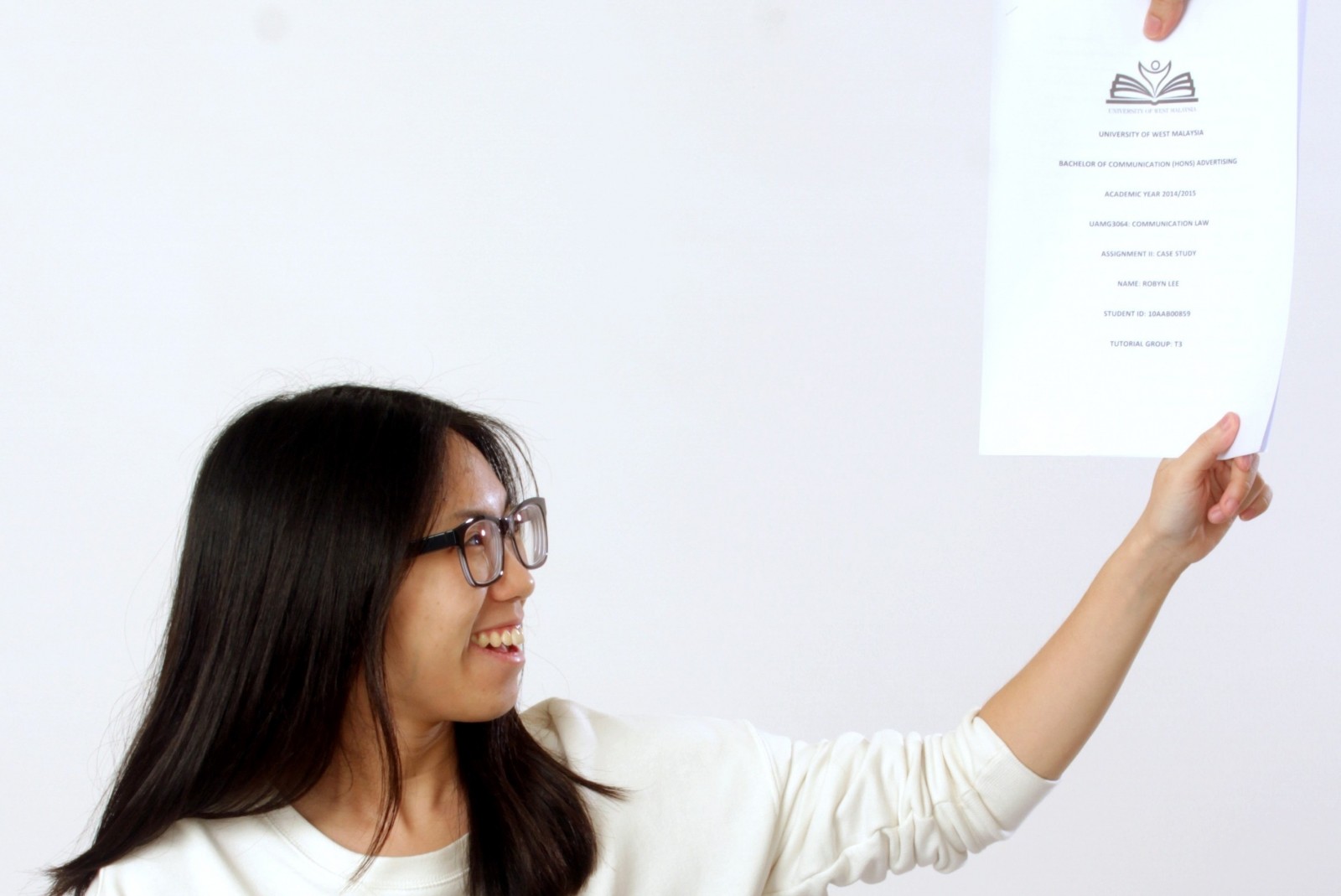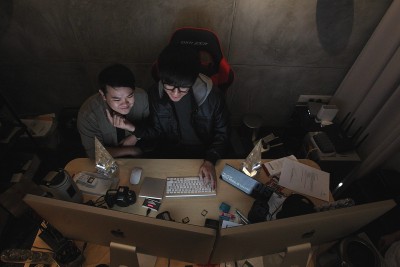By AILYN LOW, ABIRAMI DURAI and IAN YEE
alltherage@thestar.com.my
THERE’S an emerging black market in Malaysian colleges, and it’s not for illegal substances or sex – it’s for assignments.
That’s right, for as low as RM50, you can pay someone to do your college assignments for you while you sit back and blow that education fund your parents worked so hard for.
RELATED: How I was scammed by a website selling assignments
Second year business student Jeannie (not her real name), 22, has been a player on that market for the past five years.
She started out during her foundation year proofreading and editing her classmates’ assignments for a few ringgit. Today, she charges between RM50 to RM170 for individual assignments, and she has a money back guarantee on the grades.
Her biggest deal so far? RM800 for a group assignment, which she had to go on a site visit and take photos all by herself to complete.
It’s hard not to be impressed by what Jeannie does, even though she’s basically helping other students cheat.
This girl can write papers on a tonne of different subjects (she has completed assignments in Communications, Hospitality and Business), she delivers them in a matter of days, and only once has she ever failed to deliver.
“That particular lecturer was really stringent,” she said. “I refunded the RM70 to my buyer.”
And on top of that, she’s got her own studies to worry about.
“There was a week when I had to complete six assignments on the same subject. I had less than four hours of sleep a day and skipped classes the entire week, but I like the satisfaction of completing an assignment – and getting paid for it,” she said.
On a good month, Jeannie earns around RM1,200. She always has a few “regulars”, who order two to three assignments a year, but with or without them, she said there’s a constant stream of customers.
Clearly, business is good in the paid paper industry, and it goes way deeper than college sellers like Jeannie.
There are also lecturers who sell assignments, as well as literally hundreds of websites (mostly based overseas) that offer all kinds of services – toll-free helplines, 24/7 customer service, Skype consultations, plagiarism-free guarantees and so on. (One of our sources said he was scammed by one such website)
And where there’s supply, there has got to be demand.
Marked market
Most of the students we spoke to said they’ve never bought an assignment before, but pretty much all of them know it can be done.
Malaysian Association of Private Colleges and Universities president Dr Parmjit Singh said the problem “is not rampant”, especially because colleges and universities have systems in place to detect anomalies in a student’s results.
“This is not something that concerns the industry because it is not rampant. I’ve heard about people writing material for others for a fee and I know it’s a trend in the United States and Britain, but I don’t think it’s common here.
“We run very careful checks to see if students perform exceptionally well (in certain subjects), and we’re very strict about plagiarism,” he said.
That’s good to know, but what happens when it’s a lecturer who’s selling the assignments? Surely they’d know how to beat the system.

One of the countless websites selling assignments. Most of them offer perks and services like 24/7 customer service, toll free helplines, plagiarism-free money back guarantees and much more. This one even has a price calculator!
Part-time lecturer Vitta, 30, has been helping law and finance students complete their assignments since 2009, and she has never been caught.
She has sold over 200 assignments, and has no intention of stopping just yet.
Her assignments cost between RM80 to RM100 (she charges by the hour) and she guarantees good grades.
“I’m actually helping the students understand the subject better,” she said.
“They can learn from the assignments they’ve bought and get through the semester. At the end of the day, the mission and objective of learning is still fulfilled.”
According to her, she also follows up with the students to make sure they understand the assignments.
Law student Aisyah, 21, had a similarly “helpful” seller when she was doing her A-levels.
“My seller helped me with the overall flow of my assignments and included more journals and references. I was really happy as I got good grades out of it,” she said.
Her parents knew about this arrangement with her seller, who used to be her tuition teacher, but they were fine with it as she would still do the assignment herself, and she was only paying for it to be improved further.
“My dad asked whether my teacher wrote the whole assignment and I said ‘No’, so he was okay with it and gave me the money to pay the teacher,” she said.
Law student Maria, 21, had a rather different experience with her tutor.
She approached the tutor hoping for some tips for an assignment, but was shocked when the tutor sent her the complete answer via Facebook – along with charges for her services.
“She told me I could come to her if I had any questions, but I didn’t know she was actually selling assignments! I backed off straight away after knowing how much I would have to pay.
“Plus, I didn’t think her answers were that good,” she said.
The tutor then sent her a barrage of Whatsapp messages demanding payment. Maria had to block the tutor’s number.
“My experience was so unpleasant, I would never consider buying an assignment for real. Doing your own assignment is part of the learning process anyway.”
Graphic design student Kai, 24, who also sells assignments, said some sellers even continue after they graduate.
“Some of them have a lot of buyers, so it’s almost like having a second job!” he said, adding that he has earned up to RM1,000 for a single art assignment.
“It’s quite common among graphic design students. Some sellers even publicise their services on student Facebook groups.”
Beating the system
Jeannie isn’t worried about getting caught, even though she sells her assignments mostly to students in the same university as her.
“It’s risky, yes, but it’s also risky for the buyer. If they rat me out, they’ll get in trouble too,” she said.
She’s confident that lecturers looking for anomalies in the students’ results won’t find anything either.
“My buyers don’t usually come to me asking for A’s or high distinctions. They aren’t straight A students, obviously.
“So, I make sure the assignments I sell them aren’t so good that it would raise suspicion. I ask them how many classes they’ve attended, and check how much they know about the subject,” she added.
Brickfields Asia College (BAC) CEO Murali Kandasamy admits that try as they may, colleges and universities simply won’t be able to catch all those who cheat.
“Yes, we’re aware this happens and we check the assignments for plagiarism, but a university can only do so many things, and students can still find loopholes,” said Murali.
At BAC, the highest possible penalty for submitting a bought assignment is a suspension, and only one student has been caught so far.
Parmjit explained: “There is no universal method of penalising. It depends on the academic regulations in place.
“In my college, a student caught doing this would be expelled, as there is a clear intent to defraud.”
Whatever the punishment, Dr. Shanthini Pillai, an associate professor at the National University of Malaysia, believes students who buy assignments will be the ultimate losers.
“They would not have a first-hand experience of the learning outcomes the assignments are designed to teach,” she said.
Professor David James Young of Monash University Malaysia feels that it’s not just a problem for universities, but also for the students who aren’t buying assignments. “The other students will feel like they have to work extra hard to produce better assignments,” he said.
“And do you really want to get your degree by deception and feel like you’ve cheated your way through university? You may as well ask for an extension and get it done yourself!”
Jeannie herself isn’t sure if she should continue selling assignments.
“I’m a final year student now, so I understand how important it is to do things like your thesis yourself, to really absorb what you’re studying.
“I don’t want to ruin someone’s future because they ended up not learning anything in college because I did all their work,” she said.















Tell us what you think!